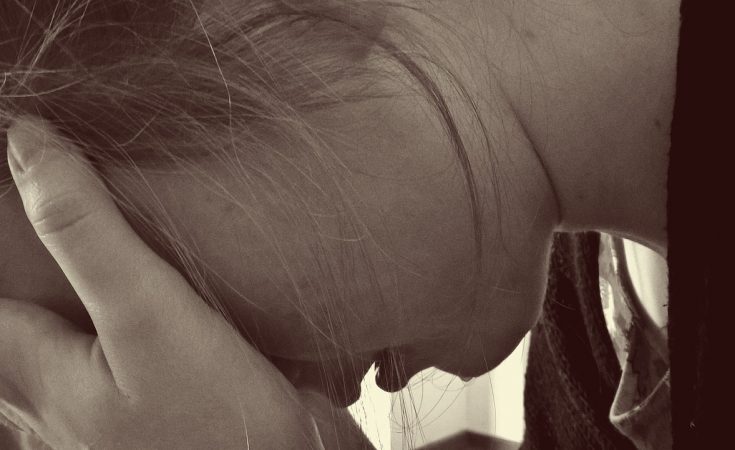Should you show or hide your sadness to your children when you are grieving?
A Bond As A Phoenix!
You may experience grieving a loved one your children didn’t even meet. It could be a longtime friend, a childhood friend or a cousin they did not have time to know yet or whom they only knew from afar… You had a special connection with him/her, a deep connection, a bond which many cannot understand, included your own children. Notice adolescents rarely show their support and emotions, especially if they are in the midst of the teenage crisis. Don’t be fooled by it. They have their own sensitivity. Not to express does not mean not to feel!
This is the whole paradox of mourning. While the loved one leaves, flying away from you, the bond which kept you united grows and is reborn through memories of the good times spent together. The bereaved then begins to relive numerous emotions. How to say goodbye to someone when happy or deep memories from the past do assail you? Death and mourning’s message for us is always the same “Live and be happy while you can”!
A Life Lesson…
How to deal with your grief when the missing person was unknown from your children? What to do, what to say? What place should you give to the communication about your grief and your emotions while at home? Should you isolate yourself or continue to do just as before pretending “everything is fine”? Between these two attitudes, is there another possibility that may both appease the grieving person and transmit a life lesson to his/her family? It is a delicate subject that we are discussing today!
A Path To Travel Alone And A Very Personal Experience…
And it is precisely because that subject is so delicate that I would like to tell you about my own experience. I lost my grandmother when my first child was five, then my youngest aunt, four years later (she left behind three children, one about 13 years old at this time), an elderly cousin and then many friends. Among them one of my childhood friends who was also the first boy to offer me a magical love declaration when I was 20. Also one of my adorable girl friends living abroad flew high at 41 years old, leaving a little boy and a big family behind… Many griefs which, fortunately, one day may come to their resolution. But before being resolved those griefs may look like a very long and a rough path… A path to travel alone most of the time. Because before all, grieving is a very personal experience… You become able to end it at one point. What others do or say is not helpful even if it may be comforting.
From Denial To Bargaining…
I must admit when my children and my husband have not known the loved one who passed, it is always more complicated to me. However it isn’t a general rule. In that case you may have the feeling of being the only one concerned. To bring back your grief at home is guilty. Children are joyful by nature, so when you mourn someone, bringing back your feelings home, you taint their spontaneous joy. You feel as you’re wasting a great value. You know you should move forward but that’s really hard and sometimes that’s just impossible. Grieving is a system. There are stages. You can’t jump over one stage but you may get stucked in one! You may pass through a stage but then go back to a previous one! You already know the grief stages: shock, denial, bargaining, depression, acceptance, reconstruction. Yet these phases are permeable to each other. Nothing is strictly delimited. It is not a race nor an obstacle course where the obstacle left behinf would never return. Everything is likely to come back… A new information about your loved one passing, a figure seen in the street, a song heard on the radio and you may find yourself rejected in an earlier grief stage. One thing that psychologists rarely tell us is that yes, a phase that is over may start again! It all depends on your mental determination but also on your traumatic memory. Is it normal or quiet long to engage?
Kubler-Ross’books helped me so much!
When I heard about my childhood friend’s passing, I was devastate! I lost all emotion, all feeling, all memory in one second. I had just moved, I was sitting among my boxes… All was both unreal and surrealist! I had a very long denial. I was traveling when he died, so I didn’t know what happened during that terrible accident. Nobody told me about his funeral. I missed that too! I knew he died instantly. I continued my life trying to be happy and do a lot of happy things as a tribute to him who loved to laugh so much. But reality caught up with me the day I read an article about his accident. It was much worse than what I had been told! How could this body that I had held in my arms have been struck so violently, so young, so quickly? A very long bargaining process followed. All my memories came back to me. I had frozen my mourning and someone had opened the freezer! Each day gave me its share of images, memories, regrets. I spent six months crying everyday, at different hours of the day, sometimes at night. I used to go to my garden to hide from the children. Tears flowed without me being able to do anything! They flowed even when I no longer felt anything! I watched for the slightest sign of him and luckily there were many. I would then read all of Kubler-Ross’s books to better understand what was happening to me… I was in a daze months, years after his death.
Cartesians Vs Signs

I was lucky after months of mental wandering to finally find an interlocutor able to tell me other thing than “it’s a complicated mourning”. I met the president of an association for the bereaved who explained to me that the duration of the bereavement and its intensity reflected the amount of love and the density of the bond that united us to the loved one. She pulled my head out of the water where so much had failed! She also found the story of this friend who had saved me – when I was younger – from bullying at school, very interesting. She did not deny the survival of the soul and although she was a very Cartesian woman she could understood what I thought were “signs from him”.
Responsabilities To Assume
My husband told the children about my loss. They couldn’t really understand because passing is an abstraction for children untill they really experience it! Also they had not known my friend. They didn’t see us laughing together. I was struggling with a strong sense of guilt because younger, even though I loved him, I had rejected his love declarations. Acceptance took a long time to come! The three following school vacation periods were complicated for me. I hid my tears in the car for example when I heard one of our songs on the radio. My husband had the feelingthat I became the widow of a man he had never known and with whom I had not even had a romantic relationship! A very complex period which would have deserved a physical distance from my family. But you know we mothers have daily responsibilities to assume! Our absence even for a few days may disorganize the full house!
Not A race!
The stages of grief come as: shock, denial, bargaining, depression, acceptance, reconstruction. Yet these phases are permeable to each other. Nothing is strictly delimited. It is not an obstacle course where the obstacle behind never returns. Everything is likely to come back. A new information about the passing, a figure seen in the street, a song and you find yourself rejected in an earlier stage. One thing that psychologists rarely tell us is that yes, a phase that is over and over can start again! It all depends on your mental determination but also on your traumatic memory. Is it normal or long to engage? That’s make a difference!
5 Tips To Apply To Ease Your Grief
- Without involving your whole family in your own grief, you have to explain things. Tell the special connection, tell the anecdotes and good times associated with the person who flew away. Also explain what criteria make it so hard.
- You can involve your family into a symbolic act such as planting a tree in the garden together, in memory of your loved one.
- You can put a photo, flowers and a candle in the house in a secluded location. It may teach your children respect for people who passed but also show them that’s possible to celebrate someone’s life even if he passed.
- Talk to your children about the concept of bond. Because more than the loved one who passed, it is often the link that seems to be broken that is mourned. In reality it is not. You are the only one to decide to sever the link with the deceased or to keep it whole. At first, maintaining the bond can be complicated. How to end your mourning by convincing yourself that the link remains? But as soon as the calming period arrives, do not be afraid to save time for yourself and think of the person who has left. As soon as I take the plane (which I always enjoy a lot), I isolate myself with a helmet on my ears, listen to some good music and remember the good times spent with my childhood friend who flew too young; To be in the skies helps me to feel closer!
Finally, children have a strong spiritual connection, which is sometimes ignored by us, adults. They understand the immensity of ties because they themselves have very healthy, pure and exclusive ties to others. Even without words, remeber that your children come from you and therefore understand yo … until a certain age. After adolescence they are already very busy with their own emotions and feelings. Life is a succession of small griefs and they have to experience their own first! That’s quiet a logical thing!




































